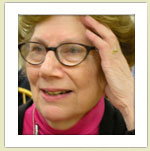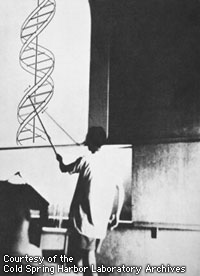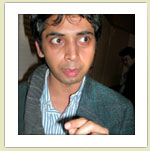|
|
 Dr.
Evelyn Witkin, geneticist, identified mechanisms of DNA repair and
recombination through experiments on bacteria.
Dr.
Evelyn Witkin, geneticist, identified mechanisms of DNA repair and
recombination through experiments on bacteria.
"When I first came here in the summer of 1944, there were a
lot of people here who were very famous, whose names I had seen
in textbooks. I was a graduate student and very overwhelmed by all
the people I met here.
"I met
Barbara McClintock
the first evening I came here. She was smoking a cigarette and reading,
and when she said who she was I almost flipped. I had just been
studying her work in my courses. She was beginning to do the work
that won her the Nobel prize [in Physiology or Medicine, 1983].
And she told me about her work, and I was very impressed. She asked
me if I'd like to come to her lab, and that began a habit. I spent
hours every week visting at her lab and hearing her talk about what
she was doing over all the years that I was here and many years
after that.
 "It
was an absolutely incredible period. Everything was happening. Every
symposium from '46 on was a story of the explosion of molecular
biology. Of course, Watson presented his model in '53. Jim passed
around a three-dimensional model of the model, and just holding
it and looking at it, I felt just the way Crick said, that this
was the secret of life. It was absolutely evident that this was
going to answer all the big questions.
"It
was an absolutely incredible period. Everything was happening. Every
symposium from '46 on was a story of the explosion of molecular
biology. Of course, Watson presented his model in '53. Jim passed
around a three-dimensional model of the model, and just holding
it and looking at it, I felt just the way Crick said, that this
was the secret of life. It was absolutely evident that this was
going to answer all the big questions.
"Cold Spring Harbor was an extraordinarily casual place [in
the 1940s]. Everybody wore shorts. Nobody wore anything else for
talks. As a matter of fact, when we would meet people walking down
Bungtown Road in jackets and ties, we would say, 'The chemists are
here!' "
For more on Evelyn Witkin,
click
here
.
 Anindya
Bagchi, mouse geneticist at the McClintock Laboratory, Cold Spring
Harbor
Anindya
Bagchi, mouse geneticist at the McClintock Laboratory, Cold Spring
Harbor
"Listening
to Sydney Brenner, Walter Gilbert, and Arthur Kornberg, I thought,
Kornberg is eighty-five years old, and when he was seventy-five
he took up something completely new in another groundbreaking area.
The kind of challenges these people engage themselves in is so inspiring
for young scientists like me. If you have the basic curiosity and
the courage to stand up and ask the most difficult questions, you
can do great science. That's the lesson I've gotten from this conference,
from these great scientists.
"Cold Spring Harbor holds some of the best conferences around
throughout the year, with some of the best minds presenting their
research here before they publish it. But this meeting is so special
because I'm seeing some of the beautiful minds whose work we have
read in the textbooks. I see them talking about an issue and how
they're building it up in their mind. None of it is 100 percent
true, because that's not how science works, but they're asking the
most bold questions, even today. Age has failed to defeat them.
It's so inspiring how dogged their spirits are."
Bagchi, who studies mouse genetics to understand human cancer, went
on to talk about the responsibility of scientists to affect public
policy. He is especially concerned about the role of environmental
pollutants in promoting cancers and the need for government to regulate
products, such as cigarettes, that are known carcinogens.
|
|

 Dr.
Evelyn Witkin, geneticist, identified mechanisms of DNA repair and
recombination through experiments on bacteria.
Dr.
Evelyn Witkin, geneticist, identified mechanisms of DNA repair and
recombination through experiments on bacteria.
 "It
was an absolutely incredible period. Everything was happening. Every
symposium from '46 on was a story of the explosion of molecular
biology. Of course, Watson presented his model in '53. Jim passed
around a three-dimensional model of the model, and just holding
it and looking at it, I felt just the way Crick said, that this
was the secret of life. It was absolutely evident that this was
going to answer all the big questions.
"It
was an absolutely incredible period. Everything was happening. Every
symposium from '46 on was a story of the explosion of molecular
biology. Of course, Watson presented his model in '53. Jim passed
around a three-dimensional model of the model, and just holding
it and looking at it, I felt just the way Crick said, that this
was the secret of life. It was absolutely evident that this was
going to answer all the big questions.
 Anindya
Bagchi, mouse geneticist at the McClintock Laboratory, Cold Spring
Harbor
Anindya
Bagchi, mouse geneticist at the McClintock Laboratory, Cold Spring
Harbor